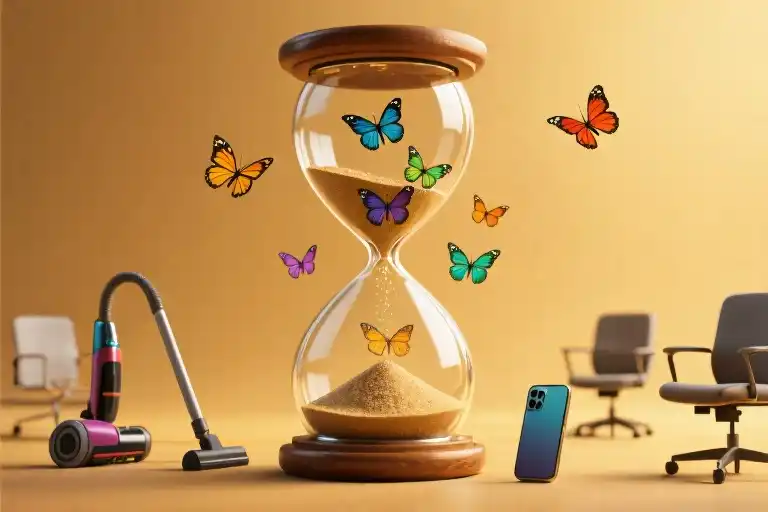The glow of your laptop screen cuts through the midnight darkness, its cold light etching shadows under your eyes. Your fingers hover over the keyboard, trapped between an unfinished spreadsheet and the gnawing sense that something vital is slipping away. Then it happens—your thumb accidentally swipes left on the phone lying beside you, revealing a forgotten photo: eight-year-old you grinning under a sprinkler, arms outstretched to catch water droplets with no concern for productivity metrics or inbox zero.
When did joy require justification? When did we start believing that every waking moment must be accounted for, optimized, and monetized? The modern world has turned leisure into a guilty pleasure, something to be earned through exhaustive labor rather than recognized as an innate human right. We’ve internalized the lie that our worth correlates directly with our output, mistaking busyness for purpose and exhaustion for virtue.
Yet in that stolen glance at childhood innocence, a quiet rebellion stirs. There exists a radical kind of luxury in our hyper-efficient age—the luxury of unapologetic uselessness. Not the performative “self-care” sold to us in scented candles and productivity journals, but the sacred idleness of watching clouds drift without checking the time, of reading poetry with no intention to quote it later, of dancing in the kitchen simply because your body wants to move.
This is the paradox we’ve forgotten: what looks like wasting time from the outside often becomes soul repair work on the inside. Those unstructured moments when we’re not trying to become better versions of ourselves are frequently when we actually do. The brain’s default mode network—that miraculous neural circuitry responsible for creativity and insight—only activates when we step off the treadmill of constant doing. The walks without destinations, the doodles in margins, the afternoons spent staring at ceilings—these aren’t failures of discipline but acts of resistance against the cult of productivity guilt.
Perhaps true wealth isn’t measured in accumulated accomplishments but in our capacity to be present with ordinary miracles: sunlight moving across a wall, the weight of a cat’s paw on your thigh, the way steam curls from a teacup on a rainy morning. These moments can’t be quantified on performance reviews or added to LinkedIn skill sets, yet they form the invisible stitching that holds our fractured attention spans together.
In a world that demands reasons for everything, choosing activities purely because they make your heart feel spacious becomes a revolutionary act. You don’t need to justify reading novels instead of business books, or explain why you sat in the park for three hours watching pigeons. The most subversive thing you can do today might be to declare certain hours “non-negotiable”—not for meditation apps or gratitude journaling, but for the kind of quiet that heals simply by existing.
That childhood photo still glowing on your phone holds an encrypted message: you were once someone who understood that play needs no purpose. The sprinkler’s arc was beautiful because it was, the ice cream cone valuable because it dripped, the summer day well-spent precisely because it wasn’t spent at all. Somewhere between then and now, we were handed a counterfeit equation—that time must equal achievement to count. But what if we’ve had it backward all along? What if the moments we dismiss as unproductive are actually the ones keeping us human?
This isn’t an argument against ambition or effort, but a reminder that life’s deepest nourishment often comes through the cracks in our schedules. The next time you catch yourself feeling guilty for “doing nothing,” consider that you might actually be doing the most important thing—remembering how to be.
The Tyranny of Productivity: How We Got Kidnapped by ‘Usefulness’
The phone vibrates at 2:37 AM. You know you shouldn’t check it – vacation started six hours ago – but your thumb unlocks the screen before conscious thought catches up. Another email about quarterly projections. Your stomach tightens. That familiar cocktail of guilt and anxiety floods your system, not because the email requires immediate attention (it doesn’t), but because you caught yourself enjoying three uninterrupted hours of reading fiction earlier.
We’ve been conditioned to wear busyness like a badge of honor. A recent global survey revealed 72% of professionals equate being constantly available with career success, while viewing unstructured time as personal failure. This isn’t accidental – it’s the modern mutation of Puritan work ethic that seeped into our collective subconscious. The same cultural DNA that once measured moral worth by barn-raising productivity now judges us by response times and side hustle counts.
What makes this particularly insidious is how productivity guilt rewires our nervous systems. Neuroscience shows compulsive busyness triggers the same dopamine loops as gambling addiction. Each completed task delivers a micro-hit of validation, making rest feel like withdrawal. We’ve essentially Pavlov’d ourselves into believing our worth decreases with every unproductive moment.
The irony? Historical analysis reveals pre-industrial workers spent nearly one-third of their waking hours in leisure. Medieval peasants enjoyed more vacation days than modern Americans. Somewhere between steam engines and smartphones, we conflated human value with output metrics, turning ourselves into walking productivity dashboards.
Here’s the uncomfortable truth they don’t put in employee handbooks: Hustle culture is spiritual wage theft. It steals your permission to exist without justification. That afternoon spent watching clouds? The morning baking bread just because? These aren’t moral failures – they’re acts of resistance against a system that profits from your constant self-doubt.
When you next feel that twinge of guilt for ‘wasting’ time, remember: The most radical thing you can do in an age of optimized everything is to occasionally be gloriously, unapologetically inefficient. Your soul wasn’t designed for perpetual productivity – it was made for the sacred pause between breaths.
The Sacred Evidence of Uselessness
Neuroscience now confirms what poets have always known – those moments we dismiss as ‘doing nothing’ are actually when our brains do their most vital work. The default mode network, that intricate web of brain regions lighting up when we daydream or gaze out windows, isn’t just idle chatter. It’s the neurological foundation for creativity, problem-solving, and what researchers call “self-referential processing” – essentially, how we make meaning of our lives.
Consider the Japanese practice of shinrin-yoku (forest bathing), where simply being present among trees lowers cortisol levels more effectively than most meditation apps. Or the Italian dolce far niente – the sweetness of doing nothing – that built Renaissance art between espresso sips. These aren’t lazy indulgences, but sophisticated technologies for human flourishing that predate our productivity obsession by centuries.
Your brain stitches together insights much like hands mend fabric – requiring slack between tension. Those afternoon walks where solutions appear unbidden? That’s your default mode network weaving patterns your focused mind misses. The song you play on repeat while staring at clouds? A neurological balm smoothing the frayed edges of your week.
We’ve mistaken the loom for the tapestry. Constant productivity keeps shuttles moving, but true creation happens in the pauses between. When Stanford researchers tracked creative output against “wasted” time, they found the most innovative ideas emerged after periods of deliberate disengagement. The mind, it seems, needs its own version of crop rotation – fallow periods that restore what constant harvesting depletes.
Next time guilt whispers that you should be doing more, remember: your most sacred work might look like wasting time beautifully. That space between tasks isn’t emptiness, but the breathing room every soul requires. As the Japanese poet Issa wrote, “Sitting quietly, doing nothing / Spring comes, and the grass grows by itself.”
Sign Your Rest Revolution Manifesto
The most radical document you’ll ever sign isn’t a petition or contract—it’s the permission slip you give yourself to exist without justification. We’ve reached the point where declaring “I need rest” feels more transgressive than any political statement. Let’s change that.
The Phrases That Break Productivity Chains
Language creates reality. These are the sentences that dismantle guilt:
- “My right to rest is non-negotiable” (say it while making eye contact with your reflection)
- “This can delightfully wait until tomorrow” (for emails that trigger your fight-or-flight)
- “I’m currently soul-nourishing” (when someone interrupts your staring-at-the-wall session)
Practice them like sacred mantras. At first they’ll taste foreign on your tongue, like speaking a forgotten ancestral language.
Digital Boundary Tools
Your devices are the productivity cult’s recruitment centers. Reclaim them:
- Phone wallpaper text: “This notification isn’t worth your cortisol” (change the color weekly to maintain visibility)
- Email signature footnote: “Sent during humane hours. Please respond whenever your soul feels ready”
- Calendar blocks: Mark “Sacred Loafing” in bold purple (the color historically associated with royalty—because rest makes you sovereign)
These aren’t cute productivity hacks. They’re tiny acts of rebellion against the machinery that grinds us into efficient dust.
The 5-Minute Inefficiency Ritual
Daily resistance training for your atrophied rest muscles:
- Set a timer for 300 seconds
- Do something with zero measurable outcome:
- Trace the path of sunlight across your desk
- Hum the same three notes repeatedly
- Watch your coffee steam perform its silent ballet
- When the alarm sounds, whisper: “This mattered more than any completed task”
At week’s end, review your inefficiency journal. Notice how these “empty” moments became the glue holding your sanity together.
The revolution won’t be optimized. It’ll be slow, meandering, and gloriously inefficient—like clouds reforming after we’ve tried to organize them into spreadsheets.
The Permission Slip You’ve Been Waiting For
The glow of your phone screen at 2am tells a familiar story – another day where productivity metrics overshadowed your humanity. That unfinished to-do list mocks you from the nightstand, its incomplete items like tiny papercuts on your self-worth. But here’s the radical truth your exhausted heart needs to hear: you come pre-approved for rest.
Your Divine Right to Do Nothing
Society sold us a cruel equation: worth = output. We internalized it so completely that sitting quietly feels like stealing. Yet neuroscience reveals our brains solve complex problems precisely when we’re not trying. Those “wasted” afternoon stares out the window? That’s when your default mode network weaves together creative solutions your frantic focus could never access.
Consider the Japanese practice of shinrin-yoku (forest bathing) where healing comes through deliberate aimlessness. Or the Italian dolce far niente – the sweetness of doing nothing. These aren’t lazy indulgences but ancient recognition that some nourishment only comes through surrender.
The Anti-Productivity Manifesto
Try this experiment tomorrow:
- Schedule 30 minutes of “sacred wasting” (set a timer if needed)
- Do something with zero measurable outcome: watch clouds, doodle badly, listen to rain
- When guilt arises, whisper: “This is my soul’s maintenance work”
Notice how the world doesn’t end. Notice how your breathing changes. That’s your nervous system remembering its natural rhythm beneath the artificial urgency of notifications and deadlines.
Your New Response Toolkit
When productivity guilt attacks:
- To colleagues: “I’m honoring my cognitive bandwidth today”
- To yourself: “Machines need downtime – why wouldn’t I?”
- To social media comparisons: “Their highlight reel isn’t my repair manual”
Download our Permission Slip phone wallpaper (text: “This message can wait – and so can you”) as a visual reminder that responsiveness isn’t morality.
The Final Authorization
Today’s assignment should lift, not weigh:
- Waste 5 minutes intentionally
- Don’t post about it
- Don’t justify it
- Just let it be
Here’s your cosmic permission slip, already signed in stardust: You are hereby released from the tyranny of usefulness. Your existence is purpose enough. Now go stare at some leaves like the miraculous, unproductive human you are.





